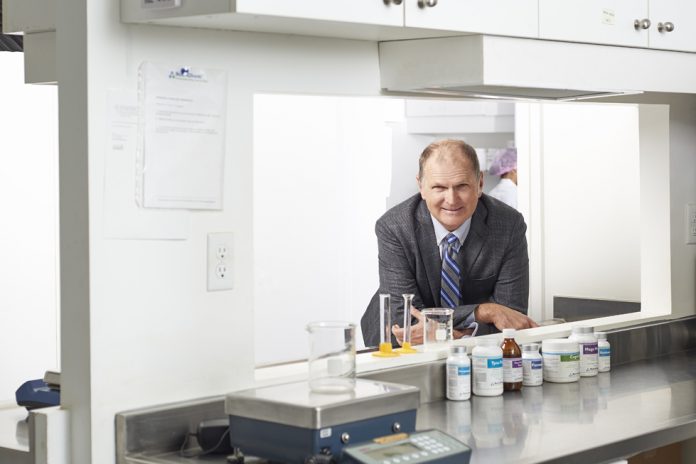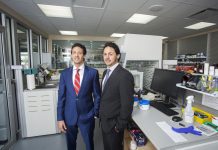In 1981, Kent McLeod, fresh out of the University of Toronto, worked for a major pharmacy chain. “I didn’t like it,” he says, without mincing words, “so I started an independent pharmacy.”
McLeod never saw the sense in a one-size-fits-all approach to customer care because, he insists, we all have different nutritional needs depending on our genetics, our health concerns and our individual body chemistry. Giving everybody the same products just because it’s more convenient or because it generates more profit simply never made sense to him. Determined to find a way to deliver personalized health solutions, he pursued his vision and opened Nutrichem 34 years ago. Compounding pharmacies were so rare back then that his was the only one McLeod was aware of.
Ask him whether he selected the original location at 1303 Richmond Road based on the demographics of the surrounding community and it will probably elicit a laugh. “What actually happened was that this was a bankrupt pharmacy and someone handed me the key. Nobody else wanted it because they thought the location was so bad and it was – and still is – surrounded by big chain pharmacies! I was never interested in competing with those guys. I wanted to do my own thing and just wondered if I could be viable doing that.”
His first forays into the nutritional industry were doing specialized compounds for kids. “I would do individualized nutritional formulas – drugs for infants – for instance, a drug that only comes in a 100 milligram capsule, I’d have to turn it into 10 mg liquid…that kind of thing.”
“From there, I actually worked with a number of Downs Syndrome kids. At the time there was a lot of work with nutrition and nutritional impact on Down syndrome. This group of parents asked me to design what I thought was the best formula based on current research for kids with Down syndrome. “ But the available research was contradictory. Opinion was split on the right approach. There were two or three studies showing benefits of this, two or three studies showing no benefits – a big hodge-podge of different opinions and different interventions. So McLeod designed what he thought was state of the art – balancing optimal benefit versus no risk.
“Your requirements can vary dramatically depending on your genetics and what’s happening in your body. And we see that regularly what you need and what you take can vary dramatically depending on your own underlying chemistry.”
“And so from there…I saw great impact, great benefits!” enthuses McLeod. “I was launched into a sort of controversy – doing customized nutrition for specific needs groups. Being the chemist I am, I always feel that everything should be individualized as much as possible for optimal benefit. We are uniquely equipped to be able to do that at Nutrichem because of our testing facility.”
There are many aspects to the main location of NutriChem Compounding Pharmacy. About half the space is occupied by their in-house clinic and laboratory. “We do get referrals from other clinics. We have patients from around the world. Our clinicians are naturopathic doctors, and clinical pharmacists and we have hormone specialized MDs as well. We have a generalized pharmacy, but every single thing in this pharmacy is a health product. There is no junk. Everything is related to health intervention. You may need information, advice or specialized knowledge to be able to use it. Clearly people self- select – but it’s all health products. If I add up all the labs and clinical spaces its probably around 7 to 8000 square feet.
“Retail would be about 4000 square feet and we have about 40 employees –15 in the store and the rest are more behind-the-scenes. There are other compounding pharmacies in Ottawa and in Canada – but we are the most sophisticated in terms of individualization of nutritionals. We are the leader in Canada in regard to individualization of hormones. And in terms of mental health – there is no one competing with us for actual leadership in terms of state of the art treatment of mental health issues without medication. Optimizing the use of nutrition and medication, we are able to deal with complicated mental/nutrient/ drug interactions…people come into our store with 25 different drugs with complicated health issues. We’re able to sort all that out.“
With natural products, individualization of therapy, drug management – it’s a pretty complex, integrated process.
“In our view,” says McLeod, “every person is interested in optimal function – optimal health, optimal quality of life with the least risk. That’s what every doctor and every person is interested in. And you have to have a very sophisticated global view to be able to deliver that advice.
McLeod believes strongly that “Everything should be designed according to what someone needs, not according to what’s in the marketplace. So if we’re looking at nutrition – as a chemist, I measure all the nutrient levels in the body – so I give people what they need. It’s pretty straight-forward; if you need more vitamin D, you should get it, if you’re iron deficient, you should get it. We’re looking at intimate chemistry, we’re looking at genetic factors. We have all this research that shows that each individual needs different nutrients based on their dietary intake, their absorption and their propensity for some disease and that gives me the hormonal status. There are all kinds of characteristics you can assess that define what each individual actually needs.
When asked about expense, McLeod admits, “It’s true that I do have to have higher margins, because there are higher service levels.”
NutriChem is not your average compounding pharmacy. They are a licenced manufacturing company that meets GMP standards. They have products that they compound on an individual basis as well as manufactured products which aren’t proprietary to them. McLeod says, “Over time, if I see a need for a product that’s not in the marketplace, we’ll design and get an NHP number for one of our own proprietary products.
McLeod’s approach may have had doubters in the beginning, but over the years, he’s emerged as an international thought leader in ortho-nutrition. He has lectured on the subject throughout North America, widely published his research and is even developing course material for other clinics based on this success of his clinic.
“What we do as consultants – and I think this is a very valuable role…often people are prescribed an agent which may not be available in generic form, but which may be the most expensive drug in its class – in cost and in risk. So we consult and actually direct people on this. For example – the typical drug prescribed for fibromyalgia is very expensive and has a 90 per cent failure rate and a 100 per cent side effect rate. “ NutriChem makes sure you have the best of both natural and drug products available to you.
“No-one delivers that information,” says McLeod. “People aren’t aware of the science behind this product and that product. And I explain this and people say, ‘wow why do you think that’s available?’ and I’ll say I agree, this is a problem we have. We’ll write a letter to your doctor saying ‘this the is evidence for our recommendation.’ And the doctor will often say – ‘oh, I didn’t know that. We should try that.’”
Getting better results is always the bottom line.
Our clients tend to be more knowledgeable, they tend to have been disillusioned with the existing system; the more sophisticated the client – the more appreciative they are of our services – the more they are aware of layers and depths of what we’re doing.
But in a recent market analysis – McLeod says, they have been reaching a wider and wider audience, cutting through all kinds of education – all kinds of socio economic groups to uncover a core group of people who are trying to approach their health in a more logical, sophisticated, integrated way – their health is important to them. When they find us, “they’re like – as a recent client put it ‘This is so logical. Why isn’t this the way we always do it?’”
Reaching out to that sort of client and connecting with them creates a particular sort of marketing challenge.
“A lot of this stuff requires some face time, says McLeod, “so we run seminars. You have to have more touch points with people – because it’s not so product-driven – it’s more about service and knowledge – so we have to get in front of people and run seminars, sponsor seminars, have doctor meetings – where doctors are sending us people.”
Nutrichem has a strong social media program. McLeod sees the process of social media as not to buy or sell – but simply to get in front of practitioners and talk to them so they go “I see! This makes sense. I want to have this guy talk to me! “
Same with the clients – it’s about relating to them on a level of essential truth. Despite the partnerships in place with practitioners McLeod says “It really is patient-driven. Many physicians don’t believe in spite of…you know I can have a doctor with ten patients who’ve had significant improvements right in front of them…and they may not ever refer to us. It’s like they don’t seem to believe what they see with their own eyes – that nutrition can affect your health.
In the not-so distant past – all drugs were compounded. If you think about it, compounding pharmacist may actually be one the world’s oldest professions. The shaman, healer, midwife and alchemist were all essentially compound pharmacists – combining two or more substances that were proven by experience to be beneficial to their patients. While modern medicine tends to look back unappreciatively on what is now regarded as folk medicine, these healers existed because they were needed and they were often effective. They used the best tools available to them at the time to bring relief from suffering. They nursed and cared for people – and that’s why they were always among the most respected members in the community. Natural health has progressed alongside medicine in terms of amassed knowledge. What modern practitioners recommend to their patients is as far from the old folk medicines as arthroscopic surgery is from the bone saw. But the pharmaceutical industry itself evolved quite differently.
“A hundred years ago,” says McLeod, “There were no big manufacturers. And then of course, we went down the road ‘we’re going to have more consistency. ‘ Like more big studies proving that one agent is going to be the answer to human health problems. And so we created a monstrous marketplace of mass merchandising of pharmaceuticals for human health. As we humans evolved, we really have made major inroads on chronic health conditions: mental health, heart disease, diabetes, Alzheimers, all these things that are big, big costs. The costs keep increasing at a logarithmic rate. Pharmaceuticals are contributing hugely to the costs – and they just don’t have good success rates.“
When he looks at the industry, McLeod asks hard questions, like, “Why does everyone with mental health issues get the same drug…or get whatever the latest manufacturer has proposed – even though the success rates are poor – even if there might be a failure rate of 80 to 90 per cent? So why don’t we look at these other things? Are they proven? Are they effective? The answer is yes, whatever your genetics, whatever you are eating. Although of course there are individual issues affecting how our brain works.
Are there any products that are good for everyone? One product for everyone? “I might say yeah, how about antioxidants – Coenzyme Q10? But the long answer is that your requirements can vary dramatically depending on your genetics and what’s happening in your body. And we see that regularly what you need and what you take can vary dramatically depending on your own underlying chemistry. But if you’re not aware of the fact, you’re simply not aware. So on the one hand, giving everybody the product is a good idea, but on another level it would be better to determine the optimal level of Coenzyme Q10 that an individual should have.
Everyone needs vitamin C. But how much vitamin C should someone take? Everyone has a different optimum level.
When asked if he has ever created mass market products, McLeod prevaricates. “I sort of have – but I always think in terms of niches – that this is what this group needs. Generally a vitamin company would have a different way of thinking. ‘I’m going to try to sell as much of this as I can.’ On the other hand, I’m thinking there’s a very defined population group that actually needs this product. I always think in terms of niches.
“I have created a proprietary version of Down syndrome vitamins. Lets say there’s someone who lives over here and can only afford 20 or 30 dollars a month for a vitamin. I have created a basic vitamin for that group. I’m not going to just create another vitamin C when that’s already available from any number of vitamin manufacturers, but if it’s in my niche – absolutely I’ll make a mass market version. I have created multivitamins for specific needs. These products are available at our store or on our website. If someone was to contact me about producing a mass market version under their own label – I would certainly be interested. While my main interest would be in being thorough – adding a clinical dimension to it, I would entertain anything because I’m a businessman. To fuel my clinical interests I need the margins to keep things going. “
“If someone came to me with the latest research on Alzheimers and asked if we had anything with an E2 blocker, I would tell them that there’s a hierarchy; that the biggest proven contributor to Alzheimers is elevated blood sugar – so we’d manage that first. The number two contributor is oxidative stress. We measure that and deal with that. The number three cause involves disfunctions in the membrane of the brain. The number four related issue that’s proven is related to energy dysfunction.
We have to manage those individual issues directly. The E2 thing is suggested to be a contributor – but it’s all just unraveling – it’s very speculative. But the other things I’ve listed – we can lay down evidence that no researcher would argue with – these things correlate 100 per cent with Alzheimer’s disease. Alzheimer’s is a multi-factorial disease. And we manage it better, we feel, than anyone else, because we are aware of all the research and we are integrating proven therapies into a full and complete treatment plan.
With just a couple locations in Ottawa, McLeod knows he doesn’t have the same sort of reach as the chain pharmacies, but Nutrichem has been working on solutions, so that if someone on the other side of the country or the other side of the world is interested in consulting with them – they can contact NutriChem and arrange to send their bloodwork in in preparation for a Skype consultation.
“It’s a really new dimension,” says McLeod. “We currently do consultations with clients in Czech Republic, Ireland, and elsewhere.”
Looking at how he brought his original vision to life, who would be surprised to see Kent McLeod find a way to bring his philosophy of personalized health solutions to the world at large?








